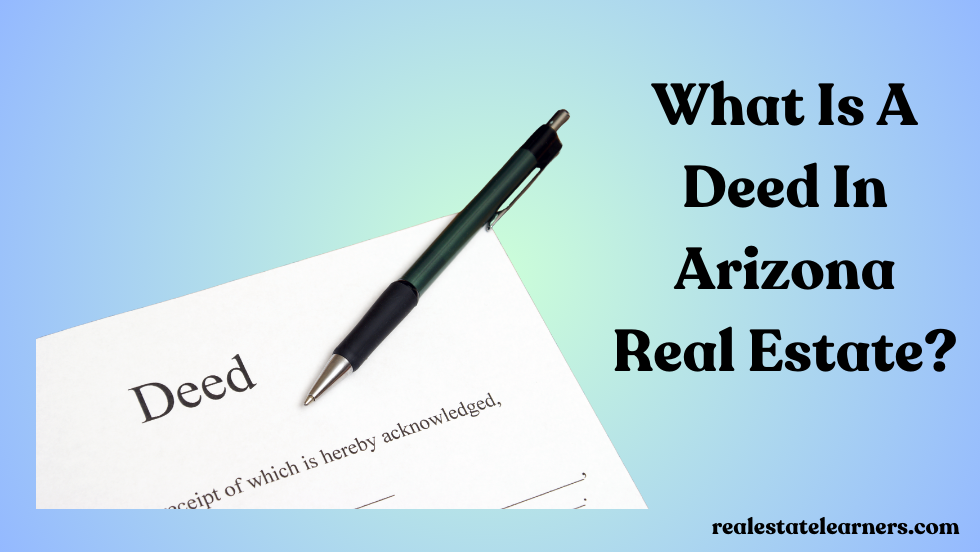Many states in the United States require property deeds to be registered or recorded in order to provide legal evidence of ownership. In Arizona, deeds are recorded with the county recorder’s office. This process ensures that the right of a property is properly documented and can be easily verified. In this document, we will provide an overview of what deeds are and why they are important in Arizona. This document will provide an overview of deeds in Arizona and how they can be obtained.
What is a deed in Arizona?
A deed in Arizona is a legal document that transfers real estate property ownership from one party to another. It serves as proof of title and acts as evidence of the transfer of ownership. In Arizona, it is necessary to register deeds with the county recorder’s office in the county where the property is situated. This process ensures proper documentation and compliance with legal requirements.
Several types of deeds can be used in Arizona, including warranty deeds, quitclaim deeds, and special warranty deeds. Each type of deed has its own specific purpose and implications.
Types of Deeds in Arizona?
Arizona has five types of deeds that are commonly used in real estate transactions. These include warranty deeds, special warranty deeds, quitclaim deeds, trustee’s deeds, and beneficiary deeds. Each type of deed offers different levels of protection for buyers and sellers.
Warranty Deeds:
In Arizona, the warranty deed stands as the prevailing choice for property transactions. It offers buyers the utmost protection by ensuring that the seller possesses a clear and marketable title to the property being sold. In simpler terms, this means that there are no lingering liens or encumbrances that could jeopardize the buyer’s ownership rights. Rest assured, this deed guarantees a secure and worry-free investment in real estate.
Special Warranty Deeds:
A special warranty deed is comparable to a warranty deed, but it solely assures that the seller hasn’t incurred any liens or encumbrances on the property during their ownership. Consequently, this specific type of deed does not encompass any pre-existing title issues that may have existed prior to the seller’s ownership of the property.
Quitclaim Deeds:
A quitclaim deed is commonly used in Arizona for transferring property between family members or in situations where the buyer and seller have a preexisting relationship. This type of deed offers very little protection for the buyer, as it does not guarantee that the seller holds a clear title to the property.
Trustee’s Deeds:
A trustee’s deed is used when a property is being sold as part of a foreclosure. It conveys the property title from the trustee, who holds it for the lender, to the new owner. This type of deed does not offer any guarantees regarding the condition or marketability of the title.
Beneficiary Deeds:
A beneficiary deed, also referred to as a transfer-on-death deed, offers property owners the ability to maintain complete control and ownership of their real estate while ensuring automatic transfer to the designated beneficiary upon their passing. This type of deed serves as a valuable instrument for transferring real property outside of the probate process.
General warranty deed Arizona
A general warranty deed is the most common deed used in Arizona. It guarantees that the seller has clear and marketable title to the property and can legally transfer ownership to the buyer. This means that the seller is responsible for any claims against the property, such as liens or other encumbrances. The seller also warrants no undisclosed defects in the property that may affect its value.
Disclaimer Deeds:
In addition to these five common types of Arizona warranty deed, there is also a type called a disclaimer deed. This type of deed is used when a person who has inherited property does not want to keep it and instead wants to give up their interest in it. The disclaimer deed transfers the ownership of the inherited property back to the estate or other designated party.
FAQs
How do I get a copy of a deed in Arizona?
To obtain a copy of a deed in Arizona, visit the county recorder’s office where the property is located. You will need to provide either the legal description or street address of the property. A fee is required for each page of the document, typically around $3 per page for certified copies, although this may vary by county. If you prefer a certified copy, you can also request it online through the county recorder’s website or by mail.
How do I add someone to my deed in Arizona?
If you want to add someone to your deed in Arizona, you must prepare a new deed that includes both of your names as owners. This requires all parties’ consent and must be notarized before it can be recorded with the county recorder’s office. Depending on the type of ownership, this may also require the assistance of an attorney or title company. I
Can I transfer property without a deed in Arizona?
Generally, transferring property with a proper deed in Arizona is recommended. A deed serves as the legal document that transfers ownership; without it, there may be issues with proving ownership or protecting your interests. However, a quitclaim deed may be used in certain situations, such as gifting property to a family member. It is always best to consult with an attorney or title company to ensure a proper and legal property transfer.
What is the title deed document?
A title deed document, also known as a deed of title or simply an act, is the legal document that transfers ownership of real estate property from one party to another. It contains the names of the buyer and seller, a description of the property, and any conditions or restrictions associated with the transfer. The title deed document also acts as proof of ownership for the new owner and is recorded with the county recorder’s office to make it official.
Conclusion
In conclusion, understanding Arizona’s different types of deeds and how they are used is essential for anyone involved in a real estate transaction. Whether you are buying or selling property, choosing the right type of deed is crucial to make sure that your rights and interests are protected.
Additionally, knowing how to obtain a copy of a deed or make changes to an existing one can be helpful in various situations. It is always recommended to consult with a professional, such as an attorney or title company, for guidance and assistance with deeds in Arizona.

Corey has over 15 years of experience as a real estate broker and educator. He is dedicated to providing valuable insights and guidance for those looking to enter the real estate industry.

